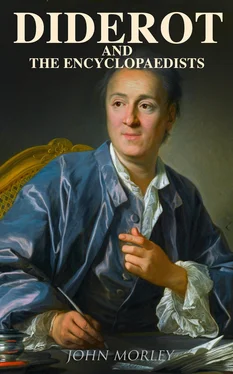Like so many others to whom literature owes much, D'Alembert was all his life fighting against bad health. Like Voltaire and Rousseau, he was born dying, and he remained delicate and valetudinarian to the end. He had the mental infirmities belonging to his temperament. He was restless, impatient, mobile, susceptible of irritation. When the young Mademoiselle Phlipon, in after years famous as wife of the virtuous Roland, was taken to a sitting of the Academy, she was curious to see the author of the Preliminary Discourse to the Encyclopædia, but his small face and sharp thin voice made her reflect with some disappointment, that the writings of a philosopher are better to know than his mask.[101] In everything except zeal for light and emancipation, D'Alembert was the opposite of Diderot. Where Diderot was exuberant, prodigal, and disordered, D'Alembert was a precisian. Difference of temperament, however, did not prevent their friendship from being for many years cordial and intimate. When the Encyclopædia was planned, it was to D'Alembert, as we have said, that Diderot turned for aid in the mathematical sciences, where his own knowledge was not sufficiently full nor well grounded. They were in strong and singular agreement in their idea of the proper place and function of the man of letters. One of the most striking facts about their alliance, and one of the most important facts in the history of the Encyclopædia, is that henceforth the profession of letters became at once definite and independent. Diderot and D'Alembert both of them remained poor, but they were never hangers-on. They did not look to patrons, nor did they bound their vision by Versailles. They were the first to assert the lawful authority of the new priesthood. They revolted deliberately and in set form against the old system of suitorship and protection. "Happy are men of letters," wrote D'Alembert, "if they recognise at last that the surest way of making themselves respectable is to live united and almost shut up among themselves; that by this union they will come, without any trouble, to give the law to the rest of the nation in all affairs of taste and philosophy; that the true esteem is that which is awarded by men who are themselves worthy of esteem. … As if the art of instructing and enlightening men were not, after the too rare art of good government, the noblest portion and gift in human reach."[102]
This consciousness of the power and exaltation of their calling, which men of letters now acquired, is much more than the superficial fact which it may at first seem to be. It marked the rise of a new teaching order and the supersession of the old. The highest moral ideas now belonged no longer to the clergy, but to the writers; no longer to official Catholicism, but to that fertilising medley of new notions about human knowledge and human society which then went by the name of philosophy. What is striking is that the ideas sown by philosophy became eventually the source of higher life in Catholicism. If the church of the revolution showed something that we may justly admire, it was because the encyclopædic band had involuntarily and inevitably imparted a measure of their own clearsightedness, fortitude, moral energy, and spirit of social improvement, to a church which was, when they began their work, an abominable burden on the spiritual life of the nation. If the Catholicism of Chateaubriand, of Lamennais, of Montalembert, was a different thing from the Catholicism of a Dubois, or a Rohan, from the vile corruptions of the Jesuits and the grovelling superstitions of the later Jansenists, it was the execrated freethinkers whom the church and mankind had to thank for the change. The most enlightened Catholic of to-day ought to admit that Voltaire, Diderot, Rousseau, were the true reformers of his creed. They supplied it with ideas which saved it from becoming finally a curse to civilisation. It was no Christian prelate, but Diderot who burst the bonds of a paralysing dogma by the magnificent cry, Détruisez ces enceintes qui rétrécissent vos idées! Elargissez Dieu! [103] We see the same phenomenon in our own day. The Christian churches are assimilating as rapidly as their formula will permit, the new light and the more generous moral ideas and the higher spirituality of teachers who have abandoned all churches, and who are systematically denounced as enemies of the souls of men. Sic vos non vobis mellificatis apes! These transformations of religion by leavening elements contributed from a foreign doctrine, are the most interesting process in the history of truth.
The Encyclopædia became a powerful engine for aiding such a transformation. Because it was this, and because it rallied all that was then best in France round the standard of light and social hope, we ought hardly to grudge time or pains to its history. For it was not merely in the field of religious ideas that the Encyclopædists led France in a new way. They affected the national life on every side, pressing forward with enlightened principles in all the branches of material and political organisation. Their union in a great philosophical band gave an impressive significance to their work. The collection within a single set of volumes of a body of new truths, relating to so many of the main interests of men, invested the book and its writers with an aspect of universality, of collective and organic doctrine, which the writers themselves would without doubt have disowned, and which it is easy to dissolve by tests of logic. But the popular impression that the Encyclopædists constituted a single body with a common doctrine and a common aim was practically sound. Comte has pointed out with admirable clearness the merit of the conception of an encyclopædic workshop.[104] It united the members of rival destructive schools in a great constructive task. It furnished a rallying-point for efforts otherwise the most divergent. Their influence was precisely what it would have been, if popular impressions had been literally true. Diderot and D'Alembert did their best to heighten this feeling. They missed no occasion of fixing a sentiment of co-operation and fellowship. They spoke of their dictionary as the transactions of an Academy.[105] Each writer was answerable for his own contribution, but he was in the position of a member of some learned corporation. To every volume, until the great crisis of 1759, was prefixed a list of those who had contributed to it. If a colleague died, the public was informed of the loss that the work had sustained, and his services were worthily commemorated in a formal éloge .[106] Feuds, epigrams, and offences were not absent, but on the whole there was steadfast and generous fraternity.
As Voltaire eloquently said, officers of war by land and by sea, magistrates, physicians who knew nature, men of letters whose taste purified knowledge, geometers, physicists, all united in a work that was as useful as it was laborious, without any view of interest, without even seeking fame, as many of them concealed their names; finally without any common understanding and agreement, and therefore without anything of the spirit of party.[107] Turning over the pages on which the list of writers is inscribed, we find in one place or another nearly every name that has helped to make the literature of the time famous. Montesquieu, who died in the beginning of 1755, left behind him the unfinished fragment of an article on Taste, and it may be noticed in passing that our good-natured Diderot was the only man of letters who attended the remains of the illustrious writer to the grave.[108] The article itself, though no more than a fragment, has all the charms of Montesquieu's delightful style; it is serious without pedantry, graceful without levity, and is rich in observations that are precise and pointed without the vice of emphasis. The great Turgot, diligently solicitous for the success of every enterprise that promised to improve human happiness by adding to knowledge and spreading enlightenment, wrote some of the most valuable articles that the work contained, and his discussion of Endowments perhaps still remains the weightiest contribution to that important subject. Oddly enough, he was one of the very few writers who refused to sign his name to his contributions.[109] His assistance only ceased when he perceived that the scheme was being coloured by that spirit of sect, which he always counted the worst enemy of the spirit of truth.[110] Jean Jacques Rousseau, who had just won a singular reputation by his paradoxes on natural equality and the corruptions of civilisation, furnished the articles on music in the first half dozen volumes. They were not free from mistakes, but his colleagues chivalrously defended him by the plea of careless printing or indifferent copying.[111] The stately Buffon very early in the history of the Encyclopædia sent them an article upon Nature, and the editors made haste to announce to their subscribers the advent of so superb a colleague.[112] The articles on natural history, however, were left by Buffon in his usual majestic fashion to his faithful lieutenant and squire-at-arms, Daubenton. And even his own article seems not to have been printed. Before the eleventh volume appeared, terrible storms had arisen, not a few of the shipmen had parted company, and Buffon may well have been one of them. Certainly the article on Nature, as it stands, can hardly be his.
Читать дальше












